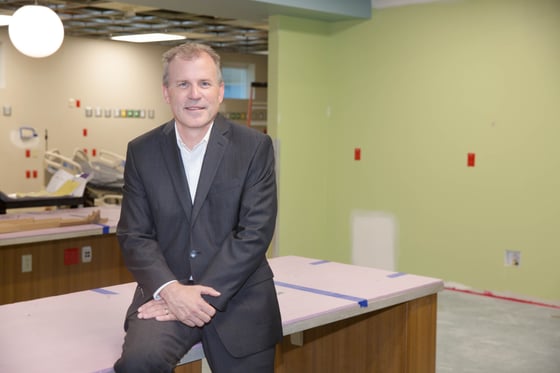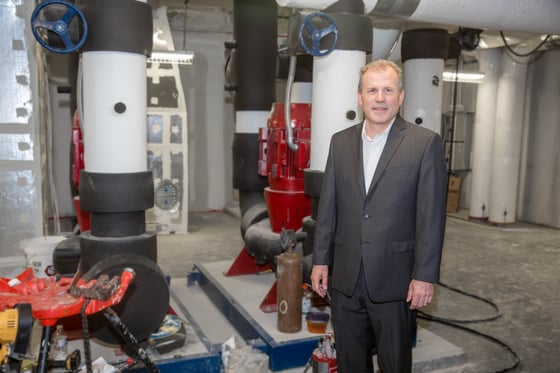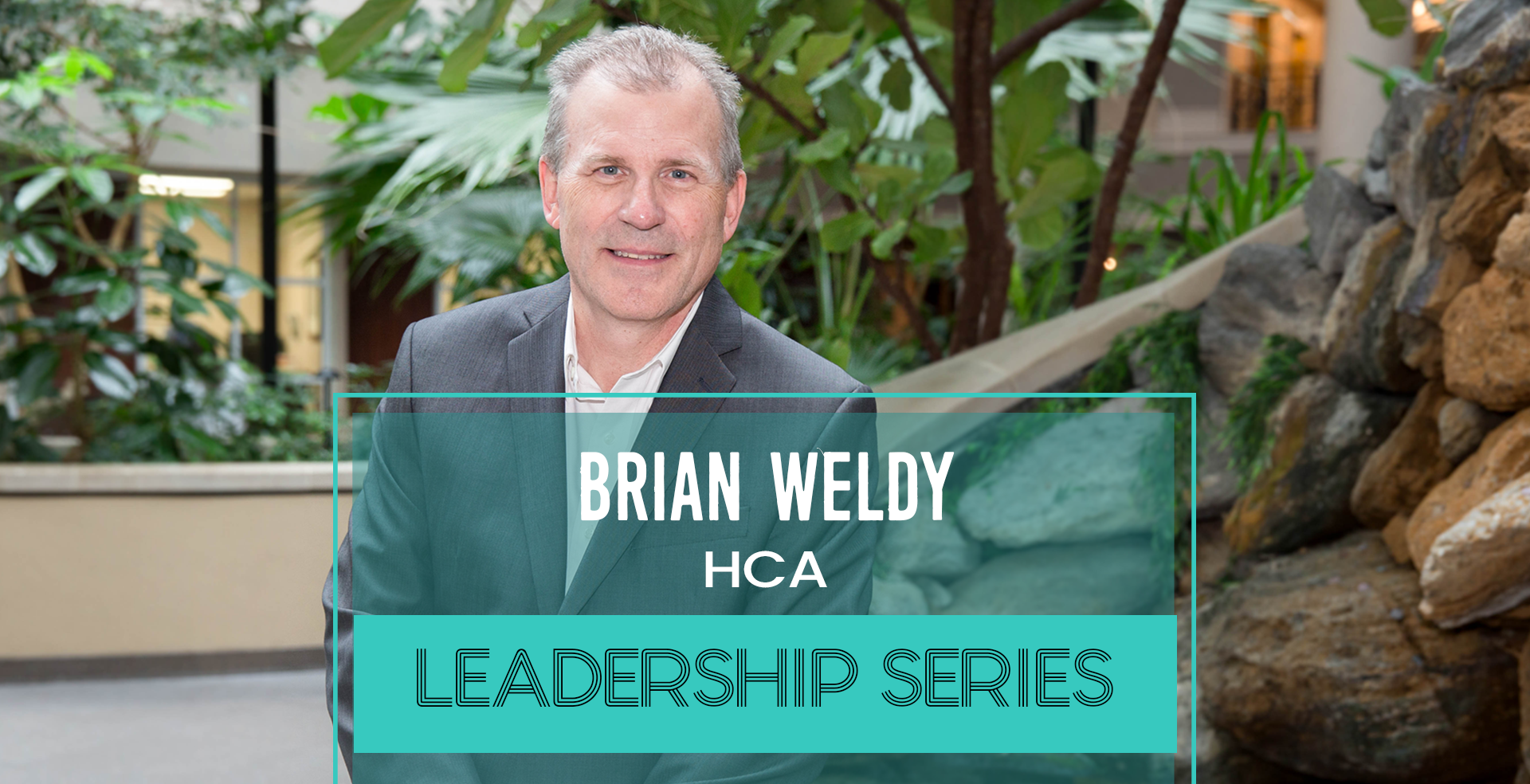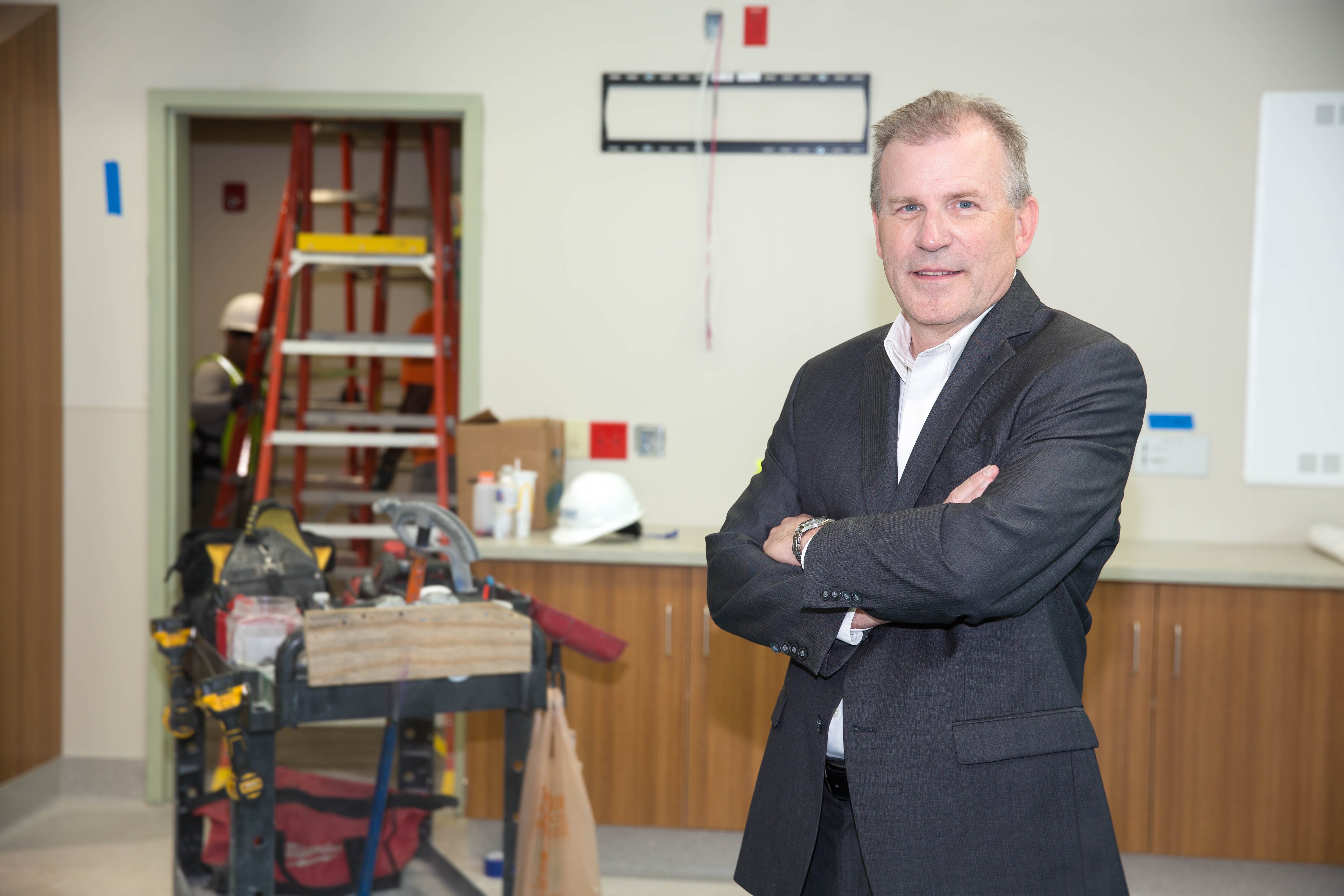According to Brian Weldy, Vice President of FacilitiGroup Infrastructure Solutions at HCA, effective leaders are akin to music conductors. The strongest ones lead the vision and strategy, assemble a quality team, and empower each individual’s unique talent for the result of an ongoing, spectacular masterpiece.
We enjoyed an insightful conversation with Brian, who shared his perspective on leadership, the trends driving transformation in healthcare, and why facilities leaders should look outside the industry for solutions to their greatest challenges…
How did you start your career in facilities?
I really got into healthcare facilities by accident. When I left college in 1983, there was a recession and therefore there weren’t too many jobs for the degree I had in chemical engineering.
I found out that the VA healthcare system was hiring engineers and I headed off to a training program in Loma Linda, California. It was a big contrast going from South Dakota to Southern California! I then transferred to the VA in Portland, Oregon for about four years, followed by Indianapolis as the Assistant Chief Engineer with my final destination as Chief Engineer within the VA System in the Kansas City area before I made the switch and move to Nashville to join HCA.
At HCA, I started off in their engineering services group and then into Corporate Facilities. The beauty of that experience is that it exposed me to a lot of different leaders with the organization. During the last twelve years I have been in the role of VP of Engineering and Facility Management which changed to FacilitiGroup Infrastructure Solutions.
How did you handle moving around so often?
If you have a career vision in mind, it may or may not present itself in the place where you currently reside. I moved a lot for advancement opportunities. This is not for everyone. My wife, who is an elementary school teacher, has been wonderful in her support in bringing us that flexibility.
Was there one mentor that was instrumental early in your career? If so, what leadership qualities made an impression on you?
 |
Two mentors stand out to me. First, very early in my career while in Portland, Oregon, the lead of the department where I worked was very engaged and included me in many different learning environments and gave me project work that stretched me beyond my experience at the time. He also taught me through demonstration how to work effectively with and through others.
My second mentor came later in my career. He treated all people with a personal level of respect. He would ask questions, listen and provide advice if asked of him. He was supportive of experimentation and allowed a certain level of risk in attempting something new. This allowed me to grow and develop and consequently taught me how to help others grow and develop in their careers.
Innovation is often about taking risks, but how much of that do you feel you’re capable of doing in a large organization like HCA?
All innovation carries with it certain risks. The key to reducing risk is to learn fast, test small, make necessary changes, validate through small pilot projects and then scale as appropriate.
At HCA innovation is a very important part of our culture and consequently there are numerous innovations that have benefited the services we provide our patients.
How do you promote a culture of innovation within your team?
Today innovation is more important than ever and a culture of innovation is necessary to nurture creativity and an attitude towards innovation. I support innovative ideas and am open to people challenging me or other team members with better methods. Occasionally it is good to ask the "5 Whys", originated by Sakichi Toyoda, to help understand why something happened or why things are currently performed a certain way. By ask “why” or even “why not” helps us to tease out ways to challenge ourselves to look for more effective ways to support our hospitals.
I am also a big fan of Roadmaps. Our roadmaps dynamically highlight innovations of each area we are working on. Teams are provided flexibility in the development of these roadmaps allowing them to identify and pursue great opportunities.
What advice would you give someone stepping into a leadership role?
If you go into a leadership role, it’s important to make a commitment to being well-rounded. I would advise others to read about other leaders that came before you in terms of what worked well and what didn’t. I listen to a lot of audio books--and of course, it’s helpful to network, look outside your industry, learn as many different perspectives as you can and find good mentors. Good leaders are teachable.
You also have to learn by doing. Everyone makes mistakes along the way, but the important thing is to learn and develop yourself from those mistakes. You can’t take things too personally because inevitably you’re going to deal with criticism.
What’s a challenge you’re currently facing in your role?
One of our key initiatives at the moment is to further enhance how we can develop a system that optimizes MRO operations for healthcare facilities. I say this in that today and in the near future our industry staffing and maintaining our facilities could become more difficult in these hard-to-recruit positions in facilities management.
The future of facilities maintenance, repair, and operations and how we best address the challenges associated with staffing and age demographics is a challenge. We have to deal with the emerging potential crisis in the hard-to-recruit positions of healthcare facilities management.
What do you believe are the trends that will shape the future of healthcare?
There are many smart minds thinking about healthcare trends and delivery in the future. It will be interesting to see where we are in 5-10 years. I believe there will be several developments.
First, there will always be a need for acute care hospitals. Some procedures and interventions need to take place in hospitals due to care complexity, access to technology and healthcare provider expertise. Effectiveness and efficiencies in hospitals will continue to improve. New hospitals will tend to be smaller than those constructed in the past and will tuck into the communities they serve.
The second trend is a growing expansion around telemedicine. Telemedicine will continue to mature and expand, with most healthcare systems looking at how they can service patients through telemedicine.
Third, there will be an increasing use of data to deliver better health outcomes. Data analytics and AI (i.e. individualized machine learning) will help optimize our health. Real-time data about our health through sensor technology and mobile technology applications will help individuals in managing their health. We see this today with our smartphones attempting to predict where we might drive next. Technology will help us better manage our health in bringing us awareness and suggested actions.
Healthcare delivery is dynamic and will need to continue to evolve in terms of how services are delivered. This, in turn, will cause a readjusting in building facilities, using tech to deliver better healthcare, and looking at telemedicine. Annual gatherings like HealthSpaces are going to be extremely interesting and amazing to learn how this change comes about.
Many consumers still believe the industry falls short on delivering a patient-centered experience. Why do you believe healthcare has such a hard time getting a handle on this?
I think the relationship issue hits on the factor of trust. The other day, I came across a study that showed that Americans’ general trust in others has tanked. The percentage that answered “yes” to the question “Would you say most people can be trusted?” went down from 46% in 1972 to 31% in 2016.
This really got me thinking, how much do people trust the healthcare system? Patient experience is a big deal in healthcare; it’s so important for patients to be able to trust in the care they are being provided. At HCA, trust, positive outcomes, and a great patient experience are interwoven into the cultural fabric in serving our patients. Trust is a must when providing healthcare to the communities we serve.
Another area that influences patient experience is the complexity of the overall healthcare system. There are many reasons for this and those systems that can be the first to drive out complexity in healthcare delivery will be leading the effort for continually improving the health care delivery experience and effectiveness.
How does your team share and implement new ideas?
A common misconception is to think that ideas alone are innovation. Ideas only have value if framed within a context. Ideas are individual ingredients being put together to create something new or different in order to solve a worthy problem and need. Ideas must be tested to validate they work and decisions made quickly along the way to continue down a particular path or pivot to another direction with new ideas.
This methodology has been popularized by what is referred to as the build-measure-learn cycle through rapid experimentation and then tested through minimal viable products of innovation heralded by Eric Ries in his book, “The Lean Startup.”
As to best practices, it is important to network with people outside your organization and industry. Also, consider how known processes that work in one area might be used in other departments or industries. For example, Waterfall and Agile are two common methods used in the software development project delivery process. We recently completed a large office renovation project with an aggressive project schedule and budget. The traditional construction process would not have worked, so we launched the project using the software Agile process for rapid design and construction as the project delivery process. I held an all-hands meeting with the team to map out our challenge and announced we would be using a project delivery process called Agile. You should have seen the faces in the room… I think many people thought I was crazy so I explained that we needed a unique approach to getting this project done. It worked: the team delivered an amazing project on schedule and under budget.
Finally, critical innovation initiatives should not be multitasked and should occur in a dedicated space. Corporations are recognizing the benefits that startups have recognized in using coworking spaces for their innovation teams.
 |
What’s something others would be surprised to learn about you?
First and most importantly, I have a wonderful wife, three sons and their families. Spending life with them is a blessing to me.
As to what do I enjoy, I am an avid aviation enthusiast... I love everything about flying and it’s something I’ve always been fascinated with. Airshows, air museums, and meeting and talking with aviators has always been enjoyable to me. Someday I’d like to get my pilot’s license. I’ve done some flying over in Alaska and other places with a certified flight instructor.
It’s kind of fun to get outside your industry and see how other worlds operate! For example, I take some of the principles of flying and think about how I could apply it to my work--I’ve used metrics and dashboards from it. Learning a new skill that’s completely different from your day to day can expand your knowledge base at work in surprising ways.
What words of advice would you give to future facilities leaders?
On priorities: Work only on the most important things and say, “no” or “not now” to everything else.
On decision-making: Make decisions only when necessary but make them quickly. Good decisions are a blend of some facts, consideration for dynamics, and timing. Don’t let perfect get in the way of doing good now.
On performance: We are only as good as our next performance. Past performances can have a very short lifespan in this world.
How would you convince a high school student today to consider facilities as a career path?
No matter how much disruption comes our way, the business of healthcare is not going away. It’s all just going to happen in different places--that could be a hospital, telemedicine in a home, or in an innovation center. My point is, the world will still need people who are experts and leaders in how to develop place. There are billions of dollars of infrastructure out there that need to be maintained, and we also need smart people to build the new health spaces of the future.
What’s really exciting, as we move forward to these new formats, is that they will be high-performance facilities that utilize cutting-edge technology, IoT, and predictive systems. The beauty of a career in facilities for a young person today is the balance of the digital innovation and an understanding of how indoor space impacts people and their health.
People like to say healthcare is going to have an Uber moment...a huge disruptor--do you think that’s an exaggeration?
I’m not sure that someone is going to rapidly crack the code with an app or something that catches everyone by surprise. Healthcare is such a complicated and interwoven system; while there's no doubt there will be significant change in the next decade, I believe it's going to be in the form of incremental improvements.
If I had to name one interesting thing to watch, it would be employee health management programs. With the Amazon, JPMorgan Chase, and Berkshire Hathaway partnership forming--among others--it’s undeniable that there’s an effort underway to manage employee care better.
This may create a pathway for other innovations. Thinking about Amazon when it started compared to what it is today is amazing. In the future, I think we’ll be able to trace our steps backward and look at the key events that helped transform healthcare, and it feels to me it's going to be through employer-managed healthcare programs. I recently had a conversation with a CEO of a large company not in the healthcare business tell me that the biggest concern for his business was the yearly rising costs of providing healthcare to his employees. It will be interesting to see how employer healthcare delivery evolves over time.
Brian Weldy will be a featured speaker at HealthSpaces taking place October 28-30, 2018 in Naples, FL. Click here to learn more.

Posted by
Collaborate with your Peers!
HealthSpaces is a community for people that plan, design, build and operate spaces where healthcare is delivered.
June 7-9, 2026 | Braselton, GA
Learn More





-4.png)
-Dec-09-2025-05-48-44-4379-PM.png)
-4.png)
-1.png)
-2.png)

Comments